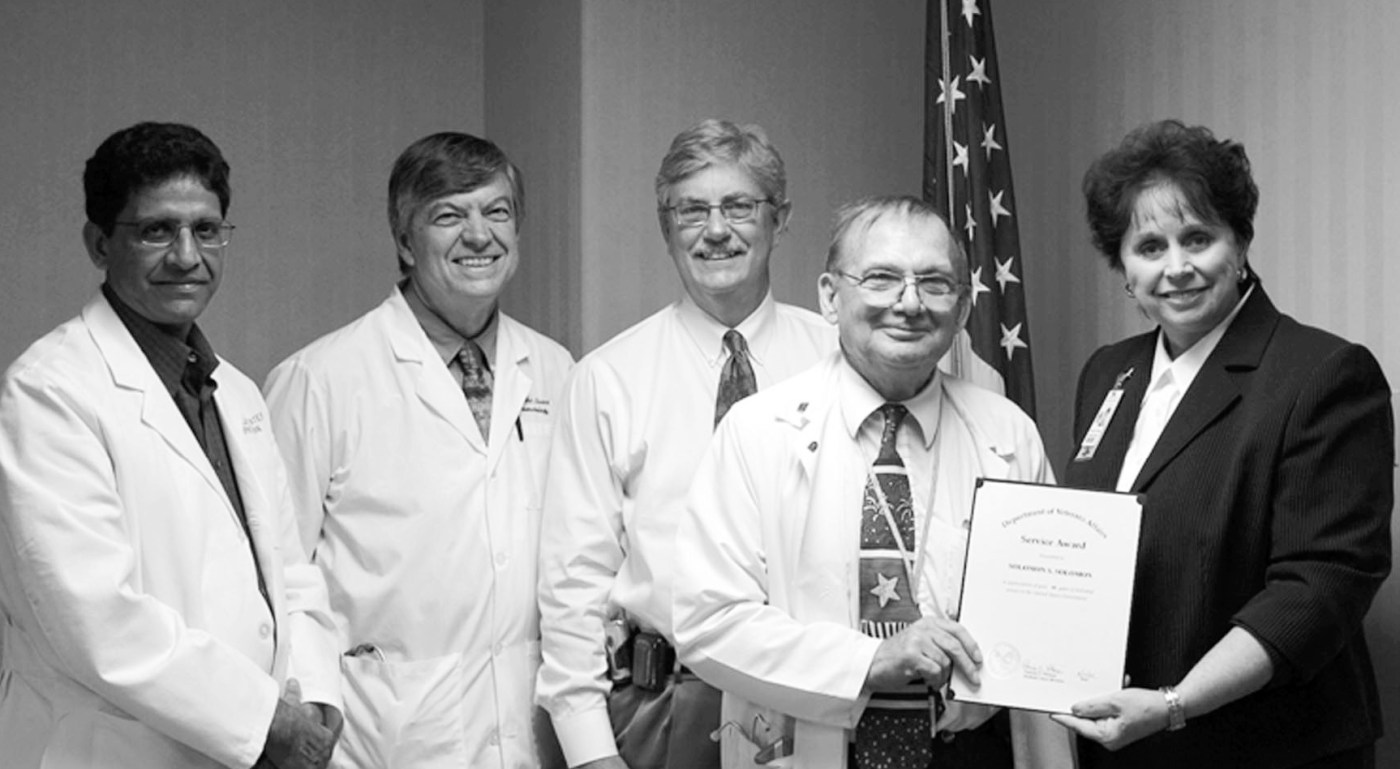Dr. Sol Solomon, (pictured above) receiving an award in 2007 for 40 years of federal service, and an Air Force Veteran, has been associated with VA for nearly a half century. He now serves as chief of endocrinology and metabolism at the Memphis VA Medical Center and as an emeritus professor of endocrinology at the University of Tennessee Health Science Center. His focus has largely been on the study of diabetes.
He’s authored many papers and has won a series of awards. His most prestigious honor was the 2010 Founder’s Medal Award of the Southern Society for Clinical Investigation. At age 81, he’s approaching the end of his career. But he believes he has time left and hopes to carry on voluntarily by counseling young doctors and physician scientists at VA and the University of Tennessee.
What drove you to military service?
I had a job involving research at the National Institutes of Health. However, I decided that the Vietnam War was my war and probably my only time to serve, so I gave that job up and enlisted in the Air Force through the Berry Plan (which allowed physicians to defer obligatory military service until they completed medical school and residency training). One of my ancestors, Haym Salomon, came to America in 1770 and is known as the financial wizard of the American Revolution. He was honored on a postage stamp in 1976. My cousin, Joe Linhart, served in the U.S. Army Air Corps in World War II and flew the Mustang fighter plane. He was shot down over Nazi-occupied France but was rescued by the free French. He and his group later received the Distinguished Flying Cross, one of the highest decorations given by the U.S. military.
What inspired your research career?
A number of events inspired my research career. I had polio at age 11 but through some miracle had no paralysis. I was accepted at the Bronx High School of Science in New York, one of the best high schools in the United States at that time. I finished second in my class out of 627 students and received a full scholarship to Harvard before submitting an application. At Harvard, I majored in chemistry and biochemistry and worked with Dr. Konrad Bloch, who asked me to be his graduate student. He went on to share the Nobel Prize in Physiology or Medicine in 1964 for a discovery related to cholesterol and fatty acid metabolism.
Dr. Sol Solomon during his days as chief of medicine at Dyess Air Force Base in Abilene, Texas, in the late 1960s.
When and where did you serve in the military? Describe your military experience.
Service to my country has always been important to me. When I enlisted in the Air Force through the Berry Plan in 1967, the Air Force offered to make me chief of endocrinology at Ramstein Air Base in Germany. That’s because I had been a fellow at Harvard of Dr. Robert Williams, one of my mentors and the author of a major textbook on endocrinology. When the Air Force told me that I’d be stationed at Ramstein outside of Munich, Germany, I declined because the entire Polish side of my family—63 people—had perished in the Nazi concentration camp at Auschwitz in World War II. Instead, I served as chief of medicine at Dyess Air Force Base in Abilene, Texas, from 1967 to 1969. During that time, the medical division at the base received an outstanding unit award.
To read the entire profile of Dr. Solomon, go to https://www.research.va.gov/researchers_whoserved/gail_cresci.cfm.
Topics in this story
More Stories
The Medical Foster Home program offers Veterans an alternative to nursing homes.
Watch the Under Secretary for Health and a panel of experts discuss VA Health Connect tele-emergency care.
The 2024 National Veteran Suicide Prevention Annual Report provides the foundation for VA’s suicide prevention programs and initiatives.






